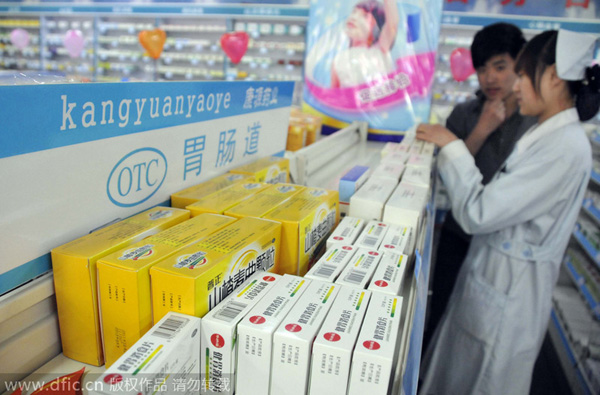 |
|
Man buys medicine with the help of a pharmacy sales person in Chongqing municipality, Southwest China, July 21, 2014. [Photo/IC] |
Export tax rebates will sharpen competitive advantage of health product companies in overseas markets.
The recent export tax rebate adjustments announced by the government will buoy the fortunes of Chinese medical product exporters and sharpen their competitive edge, industry experts said on Monday.
The Ministry of Finance last year announced adjustments in the export rebate rates for some goods, including 67 medicines and health products. Tax rebates for 55 Western medicines, four traditional Chinese medicines and eight medical devices have been revised upwards to between 2 and 13 percent, depending on the type of product.
About 6,100 companies from China are set to benefit from the new regulations, with the total value of their exports and imports being about $9.426 billion during the first 11 months of 2014, according to statistics provided by the China Chamber of Commerce for Import and Export of Medicines and Health Products.
Meng Dongping, vice-chairwoman of the chamber, said the tax rebates have come at an opportune time for the medical products industry, as it has been seeing slower growth rates in the past years. Medical product exports fell from a relatively high growth rate of 20 percent in 2012 to about 7 percent last year.
Breaking down the numbers further, Deng said the expected total volume of China's medicine exports and imports for 2014 would be about $100 billion and that there has been a slowdown in exports. The chamber estimates that exports will remain relatively subdued this year, while the global market growth rate would be around 4 to 7 percent.
According to Meng, the rapidly shrinking global market, rising costs and currency appreciation pressures are hurting exports.
In addition, domestic factors like higher human resource costs, raw materials, energy and environmental protection costs are fast eroding the price advantage of Chinese companies.
"The higher export rebates will help companies recoup some of the additional costs and also enhance the competitive advantage to some extent." The measures are especially beneficial for the biomedicine industry, she said.
"The adjustments mainly focus on the products with high added value and high technology, which means the government will encourage enterprises to develop such products," Meng said.
